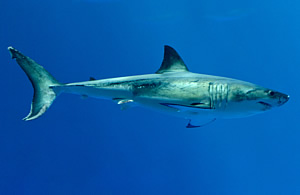
The Monterey Bay Aquarium released its great white shark today.
The sixth great white shark ever exhibited at the Monterey Bay Aquarium has been released back into the Pacific Ocean.
The young male shark brought to Monterey on August 31 is being transported to ocean waters south of Point Conception today (October 25) by the aquarium's animal care staff. He was moved out of the million-gallon Open Sea exhibit this morning.
The shark was returned to the ocean shortly after 1 p.m., approximately 2 miles offshore of Goleta, near Santa Barbara. According to Manny Ezcurra, associate curator of elasmobranchs for Monterey Bay Aquarium, "The transport went very well. The shark swam off looking well and strong, and very relaxed as he swam. He circled the boat a couple of times and then we lost sight of him."
The shark is carrying two electronic tags: a tracking tag that will documents his movements in the wild for the next 180 days, then pop free and deliver the data via satellite to researchers at the aquarium; and an acoustic tag with a five-year battery life that will report every time the shark swims past any of several monitoring buoys along the coasts of southern California and Baja California. Researchers hope to learn what changes â€" if any â€" occur in the shark's movements as it matures. This is a critical piece of information that can help manage and protect young great white sharks in the waters where they spend their early years. Counting the two tags on the shark released today, the aquarium and its research partners have placed 46 tracking tags and eight acoustic tags on young great whites. The tag is scheduled to pop free in late April and transmit those data via satellite.
The aquarium will update its Facebook page; its Twitter account, twitter.com/#!MontereyAq, and its Sea Notes blog, montereybayaquarium.typepad.com/sea_notes/, with more details on the shark as they become available.
The decision to release the shark after 55 days on exhibit was based on recent changes in how the shark was navigating in the exhibit, said Jon Hoech, director of husbandry for the aquarium.
This is not the first time a great white shark on exhibit at the aquarium has experienced "navigation" problems. Back in February 2005, the aquarium released its great white shortly after UnderwaterTimes.com and the Pelagic Shark Research Foundation published exclusive pictures showing the shark with a severely abraded nose. Again in January 2007, the aquarium had to release its captive great white shark citing "snout abrasions" and "logistical challenges" in keeping the wild animal.
"These decisions are always governed by our concern for the health and well-being of these animals under our care," Hoech said. "It became clear that it was time to release him."
The Monterey Bay Aquarium remains the only aquarium in the world ever to exhibit one of the ocean's top predators for more than 16 days.
The young shark, a four-foot, eight-inch male weighing 43.2 pounds, was collected outside Marina del Rey on August 18 by aquarium staff. He was quickly transferred to a 4-million-gallon ocean holding pen off Malibu, where he remained for almost two weeks. Aquarium staff observed him swimming comfortably and documented several feedings in the pen before the shark was brought to Monterey.
The shark gained nearly nine pounds and grew two inches during his 55-day stay on exhibit.
Exhibit of young great white sharks is one part of the aquarium's Project White Shark, an effort by the aquarium and its research colleagues to learn more about white sharks in the wild as well as to bring white sharks to Monterey for exhibit. Since 2002, the aquarium and its partners have tagged and tracked 45 juvenile great white sharks off southern California.
The aquarium has allocated nearly $2 million toward its studies of adult and juvenile great white sharks in the wild â€" research aimed at better understanding and protecting white shark populations. Details about the research program are available at www.montereybayaquarium.org/cr/whiteshark.aspx.
